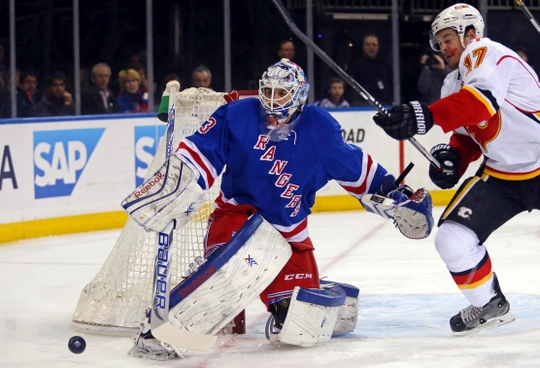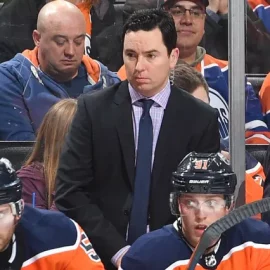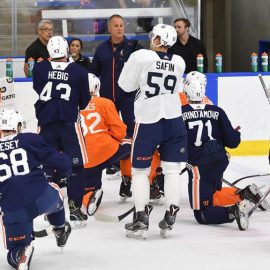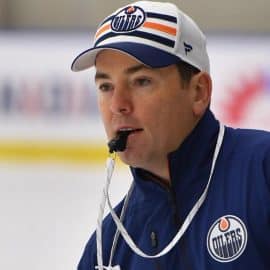On Sunday night, Connor McDavid got tangled up with Jared Spurgeon and fell to the ice. He landed chin first, and Oiler Nation held its collective breath until McDavid picked himself up off the ice and carried on. He played his next shift, but was then called off the ice by the concussion spotter. Connor was furious about being pulled and Oilers coach Todd McLellan reacted with what could only be considered disbelief. Ultimately, McDavid missed about 6 minutes of playing time, and the intermission was used to continue the concussion protocol and decide whether he was fit to return. (Spoiler: He was.) The Oilers lost anyway, and after the game had a lot to say about concussion protocol. (For the record, it’s a great move by the league to take concussion assessment out of the hands of the players and coaches
That conversation extended to Monday, when Patrick Maroon weighed in on the incident with the following:
I’m not overly concerned with the intent behind Maroon’s statement; I genuinely believe he was referring to the NHL and not hockey in general. There’s an ethos surrounding hockey that implies it’s the toughest game in the world (though I’m sure rugby players might have something to say about that), and Maroon exemplifies that belief. He’s made his money by playing big and tough and there’s nothing wrong with that. Aside from the obvious misconception that only big hits cause injuries, what Maroon said is par for the course when it comes to discussing hockey players, and toughness and playing through pain lest they be considered soft.
For Maroon to suggest that McDavid was fine and didn’t need to be evaluated in the quiet room because hockey is “a man’s game” isn’t surprising, and that is precisely the problem.

The implication that only real men can play in the NHL is damaging on many fronts. When you take into account the number of very talented hockey players whose careers were ended due to ‘soft’ injuries like concussions (Marc Savard, Eric Lindros and Paul Kariya come to mind), there’s an interpretation of Maroon’s comments that suggests those athletes are somehow lesser for not being able to play through the pain.
Pat Maroon is a professional athlete, playing hockey in a small-market Canadian city. He has to know by now that his words have weight and will be interpreted in a variety of ways by a variety of people.
The other interpretation of Maroon’s comments is this: that hockey is a man’s game, and there’s no place for women. He didn’t say those words and did attempt to clarify later, but the damage was done. If that’s the reaction someone had to Maroon’s comments, then that’s the reaction someone had. We don’t get to tell people that they’re wrong, or that they’re overreacting. There is a problem in the phrasing he chose, and while it was more than likely not intentional, what he says matters.
Jeff Veillette hit the nail on the head in a thread that was secondary to a conversation about how we treat players with concussions.
That’s ignoring the fact that MAN’S GAME throws an entire gender of fans and players under the bus, but that’s a whole different subject.
— Jeff Veillette (@JeffVeillette) December 6, 2016
One I won’t go into too much because I’m assuming Maroon was doing a “man vs boy” comparison, but still a bad subconscious phrasing choice.
— Jeff Veillette (@JeffVeillette) December 6, 2016
The Takeaway
Was Patrick Maroon being sexist? I don’t think so.
Did some people interpret it that way? Absolutely.
Is there anything wrong with that? No.
There’s been discussion forever about why it’s so hard for women to establish themselves in sports journalism, and an issue like this is one of the reasons. This isn’t the same thing as dropping a c-bomb on someone, or calling women whores. This is a small sample of the unwritten, institutional sexism that exists in our world. If people understood Maroon’s comments to be sexist, chances are they have a reason (and that reason isn’t because they’re feminazis or whatever other names you want to throw out there). It’s not for us to question that reason, or that interpretation. Instead, we should step back and hear what people are saying before we jump down their throats and tell them they’re wrong.
Pat Maroon said something dumb and then said something dumber to try to fix it. He certainly doesn’t ‘play school’, and he can’t really be at fault for that. What he should realize, however, is this: He has a platform, and a voice, and people obviously care what he has to say. If they didn’t, there wouldn’t be any discussion about it.
Add The Sports Daily to your Google News Feed!








